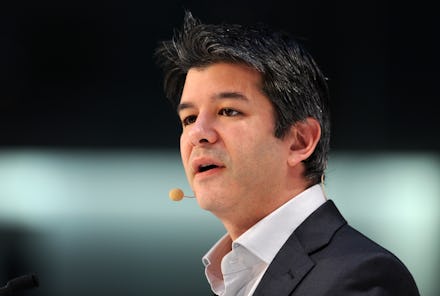A woman was raped by her Uber driver. The company allegedly said she made it up.

In December 2014, a woman was raped by her Uber driver in India.
At that time, Travis Kalanick responded with the following statement: "What happened over the weekend in New Delhi is horrific. Our entire team’s hearts go out to the victim of this despicable crime. We will do everything, I repeat, everything to help bring this perpetrator to justice and to support the victim and her family in her recovery."
But it was recently reported that Uber executive Eric Alexander obtained the woman's medical records about a week after Kalanick made that statement, and showed them to both Uber SVP of business Emil Michael and Kalanick.
On Thursday, the woman filed a lawsuit against Uber given the new information — reportedly that Alexander obtained her confidential medical records, shared them with other executives and then discussed whether her rape was part of a competitor's plan to rival Uber's growth in India.
Jane Doe's lawyer blasts Uber for "toxic gender discrimination that is endemic" at the company
Douglas Wigdor, who is representing Jane Doe, said in a statement, "It is shocking that Travis Kalanick could publicly say that Uber would do everything to support our client and her family in her recovery when he and other executives were reviewing illegally obtained medical records and engaging in offensive and spurious conspiracy theories about the brutal rape she so tragically suffered."
He continued:
Rape denial is just another form of the toxic gender discrimination that is endemic at Uber and ingrained in its culture. Hopefully, this lawsuit coupled with the changes recommended by the independent counsel will create real change and reform at Uber and elsewhere.
An Uber spokesperson said in a statement, "No one should have to go through a horrific experience like this, and we're truly sorry that she's had to relive it over the last few weeks."
Uber is silent on details of the case
Uber did not respond to repeated requests for comment on the news that executives had handled this woman's private medical records, nor did it say what the company would do to assure users that, in the event someone is sexually harassed or assaulted by an Uber driver, the company would appropriately handle the situation.
The complaint notes that none of the three Uber executives who looked through Jane Doe's confidential records have any medical training. The execs allegedly discussed Doe's records with other team members, theorizing that the rape was "made up" as part of a conspiracy that it was part of a competitor's plan.
The execs allegedly discussed Doe's records with other team members, theorizing that the rape was "made up" as part of a conspiracy that it was part of a competitor's plan.
"By focusing on 'whether she was really raped at all,' and painting plaintiff as an opportunist and a liar, defendants seemed to be assuring themselves that the only reason why a woman would report a sexual assault is for personal gain, rather than to prevent similar crimes from occurring again or to right an injustice," the lawsuit states.
This is not the first time Kalanick has mishandled allegations of assault by an Uber driver. In September 2013, about a year before the rape in India, a female passenger in Washington, D.C., claimed she was assaulted by her driver.
A leaked email from Kalanick to Uber's press team said that Uber needs to "make sure these writers don't come away thinking we are responsible even when these things do go bad," shirking responsibility for assault or harassment that happens in Uber cars.
Dave Sutton, a spokesperson for Who's Driving You, an initiative of the Taxicab, Limousine and Paratransit Association that documents incidents of assault and harassment in ride-sharing cars, noted that Uber resists efforts to require its drivers to get a fingerprint background check in order to ensure public safety. At the time of Jane Doe's rape, Uber did not conduct background checks in India.
"More than 200 Uber passengers have reportedly been sexually assaulted by Uber drivers," Sutton said. "Yet, Uber denies it has a problem in the same way it denied the reality of the India passenger's experience."